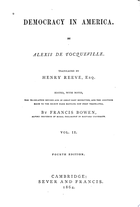Quotes from book
Democracy in America

De La Démocratie en Amérique is a classic French text by Alexis de Tocqueville. Its title translates as On Democracy in America, but English translations are usually simply entitled Democracy in America. In the book, Tocqueville examines the democratic revolution that he believed had been occurring over the previous several hundred years.

“Liberty cannot be established without morality, nor morality without faith.”
Original text: À côté de ces hommes religieux, j'en découvre d'autres dont les regards sont tournés vers la terre plutôt que vers le ciel ; partisans de la liberté, non seulement parce qu'ils voient en elle l'origine des plus nobles vertus, mais surtout parce qu'ils la considèrent comme la source des plus grands biens, ils désirent sincèrement assurer son empire et faire goûter aux hommes ses bienfaits : je comprends que ceux-là vont se hâter d'appeler la religion à leur aide, car ils doivent savoir qu'on ne peut établir le règne de la liberté sans celui des mœurs, ni fonder les mœurs sans les croyances ; mais ils ont aperçu la religion dans les rangs de leurs adversaires, c'en est assez pour eux : les uns l'attaquent, et les autres n'osent la défendre.
Introduction.
Source: Democracy in America, Volume I (1835)
Context: By the side of these religious men I discern others whose looks are turned to the earth more than to Heaven; they are the partisans of liberty, not only as the source of the noblest virtues, but more especially as the root of all solid advantages; and they sincerely desire to extend its sway, and to impart its blessings to mankind. It is natural that they should hasten to invoke the assistance of religion, for they must know that liberty cannot be established without morality, nor morality without faith; but they have seen religion in the ranks of their adversaries, and they inquire no further; some of them attack it openly, and the remainder are afraid to defend it.

“everybody feels the evil, but no one has courage or energy enough to seek the cure”
Source: Democracy in America

Variant translation: In towns it is impossible to prevent men from assembling, getting excited together and forming sudden passionate resolves. Towns are like great meeting houses with all the inhabitants as members. In them the people wield immense influence over their magistrates and often carry their desires into execution without intermediaries.
Source: Democracy in America, Volume I (1835), Chapter XV-IXX, Chapter XVII.

“The power of the periodical press is second only to that of the people.”
Source: Democracy in America, Volume I (1835), Chapter X-XIV, Chapter XI.

Original text: [...] si l'on y rencontre moins d'éclat qu'au sein d'une aristocratie, on y trouvera moins de misères; les jouissances y seront moins extrêmes, et le bien-être plus général; les sciences moins grandes, et l'ignorance plus rare; les sentiments moins énergiques, et les habitudes plus douces; on y remarquera plus de vices et moins de crimes.
Introduction.
Democracy in America, Volume I (1835)

Original text: Il n’est pas nécessaire que Dieu parle lui-même pour que nous découvrions des signes certains de sa volonté; il suffit d’examiner quelle est la marche habituelle de la nature et la tendance continue des événements; je sais, sans que le Créateur élève la voix, que les astres suivent dans l’espace les courbes que son doigt a tracées.
Introduction
Democracy in America, Volume I (1835)